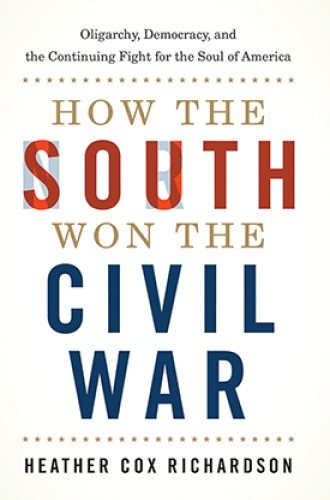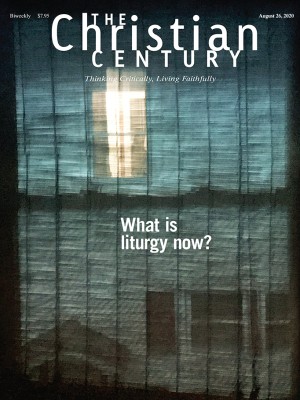How Heather Cox Richardson looks to the past for hope
The “Letters from an American” author provides historical context for today’s threats to democracy.
Police brutality, rigged elections, corrupt politicians, economic uncertainty, soaring inequality, racial injustice, democracy itself under threat—has America ever seen a year like 2020?
Well, yes, says Heather Cox Richardson, professor of history at Boston College. Many of today’s horrors have been present, either openly or as unacknowledged undercurrents, since before the founding of the United States. Twice, in fact, American democracy has been seriously jeopardized by a minority of wealthy white men. The first time began in the 1850s and culminated in the Civil War. The second time is now.
Richardson describes herself as “a political historian who uses facts and history to make observations about contemporary American politics.” The author of five previous books, she has become wildly popular since last year, when she began writing “Letters from an American,” a daily reflection setting the day’s news in historical context. Her Facebook page has more than half a million followers, with several thousand more added every day. When COVID-19 made bookstore signings impossible, she began promoting her newest book through twice-weekly lectures live-streamed on Facebook. These hour-long sessions average more than 100,000 views each.
Read our latest issue or browse back issues.
And yet Richardson, a bespectacled middle-aged academic, is an explainer, not an entertainer. For those who feel overwhelmed by the constant onslaught of distressing news, her posts focus attention on what’s important. For those who fear what the future may hold, her videos give assurance that America has survived similar assaults on democracy.
For those who want to go deeper, she offers How the South Won the Civil War. It’s well referenced, clearly written, not too long, and full of anecdotes that will hold the attention of a wide audience. The book has a single thesis: that a contradiction at the heart of American democracy—rule by the people—makes the nation especially vulnerable to oligarchy, rule by the privileged few.
On the one hand, the Declaration of Independence was an extraordinary accomplishment. To the hereditary monarchs who ruled Europe, she explains, it was not “self-evident that all men are created equal, that they are endowed by their Creator with certain unalienable Rights, that among these are Life, Liberty and the pursuit of Happiness.” The United States was the first nation to be founded on those principles.
On the other hand, most of the Declaration’s signers owned slaves. “The radical idea that all men were created equal,” Richardson writes, “depended on the traditional idea that all men were created unequal and that a few wealthy men should control the government, and therefore the lives, of women and men of color.”
In other words, America’s founders preached equality, liberty, and democracy while practicing inequality, enslavement, and oligarchy. Richardson calls this contradiction the American paradox.
Richardson’s thesis may be a self-evident truth, but her examples disturb by their sheer abundance. In case after case, from 17th-century planters to 21st-century talk-show hosts, moneyed white men and their governments have pursued their own territorial and financial interests by abusing the very people who made their riches possible—black workers (whether enslaved or free), Native American landowners, Mexican ranchers, Chinese laborers, white industrial workers, and women of all ethnicities.
Her examples also disturb with their geographical pervasiveness. Not only in the South but also in the Northeast and the West, an elite minority has continually tried to maintain control through intimidation, legislation, voter suppression, displacement, propaganda, and outright murder, even as it has celebrated such symbols of democracy as mythical self-sufficient farmers and supposedly independent cattlemen.
Most disturbing of all, the paradox persists. Ronald Reagan and George W. Bush may have worn cowboy hats, but their policies “mirrored the warning posed by the Democrats during the Reconstruction years: a behemoth federal government was using tax dollars to help redistribute wealth to undeserving black people.” The only change was that politicians now used code words—“welfare queen,” “Willie Horton”—instead of outright racist terms as they cut taxes and deregulated businesses for the rich while increasing police funding and slashing social programs for the poor.
“As had been the case a century and a half before,” Richardson notes, “keeping capitalists free from regulations and taxes moved wealth upward.” And in case the poor, who greatly outnumbered the rich, took notice and protested, various attempts at voter suppression surged. “By 2016,” Richardson writes, “Republican leaders sounded eerily like antebellum slaveholders in their defense of a system in which wealthy elites ruled over the masses.”
Richardson makes only passing mention of how Christians may influence the American paradox. It might reasonably be expected that they would choose to serve God rather than mammon, would recommend servant leadership rather than domination, and would affirm human dignity in all persons. Indeed, many have done so. Richardson points out, however, that candidates who favor property over people, power over service, and oligarchy over democracy count on evangelical Christians as a significant part of their base.
Depending on how those Christians vote, this November’s election could end the paradox—and democracy—altogether. But Richardson’s study of the 19th century makes her guardedly optimistic about the 21st. “When a group of slaveholders embraced the idea that they, and they alone, should control the nation’s political and economic system, thus threatening democracy in the 1860s, Americans fought back and rededicated the country to equality,” she writes. “Now, for the second time, we are called to defend the principle of democracy. Crucially, this time all Americans have a say in the outcome.”






